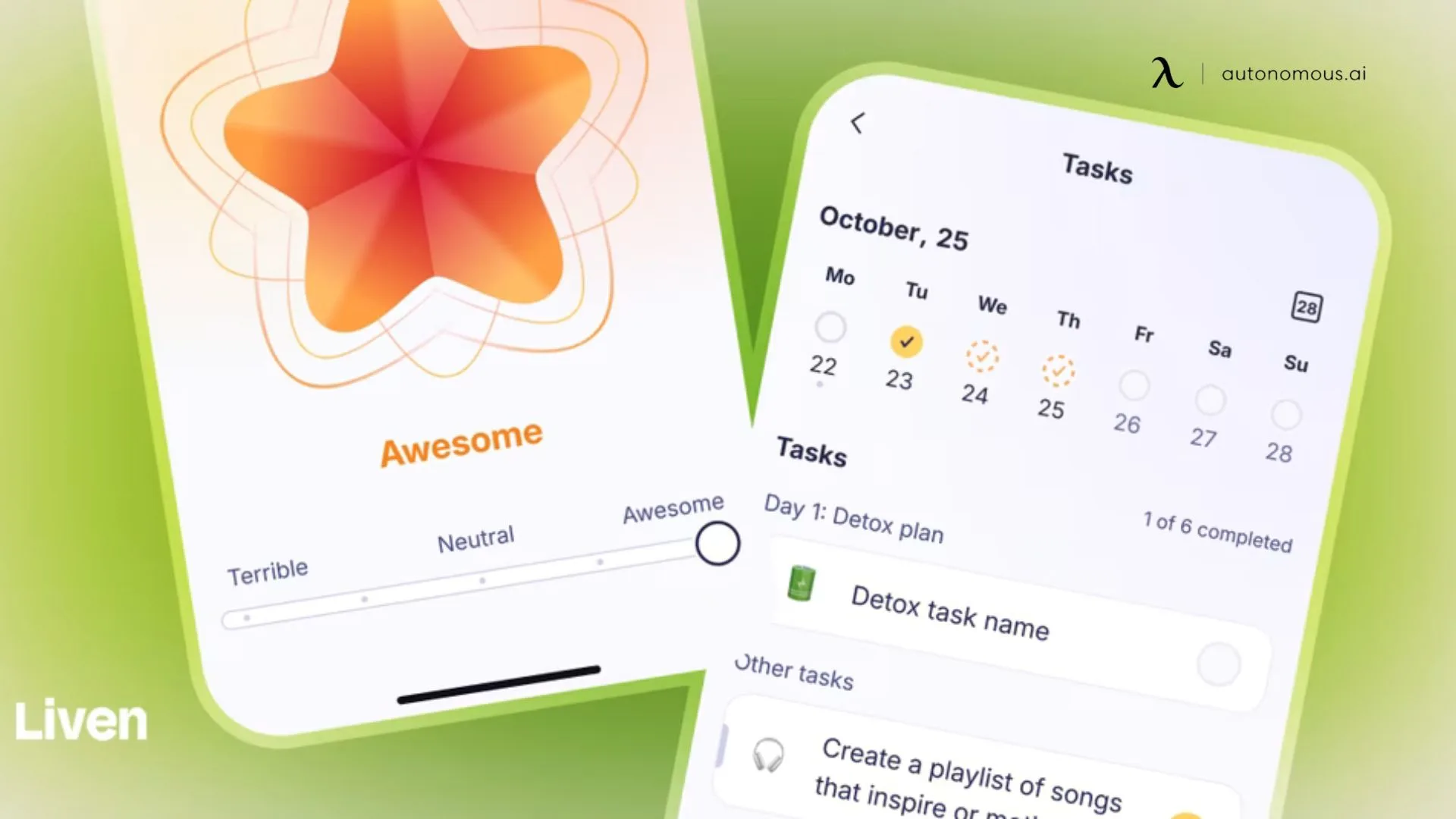
Liven App Review: Worth It? Pricing & Full Features
Table of Contents
As we navigate the complexities of modern life, finding effective tools to support mental wellness and self-improvement has become essential. The Liven app promises to be one such tool, offering users a self-discovery companion that helps track moods, build better habits, and manage stress.
After using the Liven app for a while, I wanted to share my detailed experience. In this Liven app review, I’ll explore how the app works, its features, and whether it’s truly worth the hype.
What is the Liven App?
The Liven app is marketed as a self-discovery companion designed to improve emotional well-being through mood tracking, habit formation, and personalized advice. With features like bite-sized courses, an AI companion named Livie, and a routine builder, the app aims to guide users toward greater self-awareness and better mental health management.
This is especially useful in the context of managing mental well-being in the workplace, where tools like Liven can help individuals cope with stress and stay focused. Creating a mentally healthy workspace is crucial, and if you’re looking for more ways to prioritize well-being at work, check out some practical tips on how to improve mental well-being in the workplace.
For many, work-related stress can lead to mental health issues. That’s why apps like Liven are so important in helping individuals manage their emotional states. If you're dealing with mental illness at work, it’s vital to recognize how it can impact your performance and well-being. To dive deeper into the effects of mental illness in professional environments, our article on mental illness at work provides valuable insights.
.webp)
How Does the Liven App Work?
The app operates by tracking your emotions and providing tailored content based on your mood patterns. It encourages you to log your emotional states throughout the day, helping you identify trends and underlying causes of stress or happiness. Alongside mood tracking, Liven app habits help users set and complete daily tasks to improve productivity and well-being. This feature can be especially useful for managing stress in the workplace, which, if left unchecked, can impact both productivity and overall health.
1. Mood Tracking
The mood tracker is the backbone of the app. It’s simple and intuitive to use, allowing you to log your emotions on a scale. I found this feature particularly helpful in identifying what triggered certain moods, allowing me to work through challenges in a more focused way. Over time, this helped me understand how my emotions impacted my daily routine and vice versa. Since many of us are balancing emotional well-being with remote work, tracking your moods can be especially important for preventing remote work burnout. If you're managing work from home, you might find it useful to check out some essential work from home must-haves that can support both your productivity and well-being.
2. Livie, the AI Companion
One of the most unique aspects of the Liven app is Livie, the AI-powered companion. Livie engages you in reflective conversations, offering suggestions to reframe negative thoughts or boost your mood. It’s like having a personal mental wellness coach available 24/7. I found Livie’s responses surprisingly thoughtful, and it was an interesting way to process difficult emotions without feeling judged.

3. Bite-Sized Courses
The app also offers bite-sized courses that tackle various topics like procrastination, stress management, and self-doubt. The courses are research-backed and designed to help users learn techniques for emotional growth. However, while the courses are useful, they often felt a bit too generic. A more personalized approach would have been appreciated.
4. Routine Builder & Well-Being Tests
Liven app habits feature a customizable routine builder, where you can set daily tasks to improve your mental and emotional well-being. I created small, achievable goals for myself, which gave me a sense of accomplishment each day. The well-being tests were also useful for checking in on my emotional state and tracking progress over time.
Liven App Pricing: What Does It Cost?
Understanding the Liven app cost is crucial before committing to this mental wellness platform. After testing the app extensively, here's the complete breakdown of Liven app pricing and what you get with each plan.
Feature | Free Plan | Premium Plan |
Monthly Cost | Free | $9.99/month |
Annual Cost | Free | $59.99/year (50% savings) |
Mood Tracking | Basic tracking | Advanced analytics & trends |
AI Companion (Livie) | Limited conversations | Unlimited conversations |
Bite-sized Courses | 3 free courses | Full library (50+ courses) |
Routine Builder | Basic routines | Advanced customization |
Well-being Tests | Monthly tests | Weekly detailed assessments |
Liven App Reviews: Pros and Cons
After spending time with the Liven app and digging through reviews on the App Store, Google Play, and Reddit, I’d say my experience lined up pretty closely with what a lot of people have been saying.
There are a few things Liven does well, but also some frustrations that kept coming up again and again. Here’s the honest breakdown.
1. What I Liked
- Easy Onboarding & Guided Setup
The setup process is one of the app’s strengths. Instead of dropping a long questionnaire or endless forms in front of you, Liven guides you step by step. I could complete it in little pieces while getting ready in the morning, and it didn’t feel like a chore.
Other users echoed the same sentiment, noting how approachable the onboarding feels, especially if you’ve abandoned other wellness apps for being too complicated right from the start.
“The beginning setup is super easy and guided was able to do it in little chunks through my morning so I didn’t get overwhelmed and quit.”
— A Liven wellbeing app review on Apple Store Review
- Affirming & Supportive Language
Liven’s use of language is worth noting. The tone throughout the app is encouraging, almost conversational, and it avoids the clinical feel that some wellness platforms have. When I tested it after a stressful day, the way prompts were phrased actually made me want to continue, rather than shut the app and walk away.
Liven wellbeing app reviews on the App Store also pointed this out, with people saying the affirmations helped them feel comfortable sharing honestly.
“The language used is very affirming and helped me feel safe to engage from a vulnerable place of trying something new.”
— A Liven wellbeing app review on Apple Store Review
- Mood Tracking & Daily Check-Ins
The mood tracker is simple, but it does its job well. In just a week of logging, I noticed patterns I hadn’t consciously picked up on — like certain tasks draining me more than others or my energy dipping at specific times of the day.
For people juggling work and personal stress, that kind of reflection can be valuable. Some reviewers mentioned that while the tool is basic, it’s the one feature they kept using daily because it delivered small but consistent insights.

- Livie AI Companion
Livie is probably the most unique part of Liven. At first, I expected canned responses, but the AI surprised me with thoughtful nudges. For example, when I logged feeling anxious, it suggested reframing my thought rather than just giving me a generic “it will be okay.”
It’s not therapy, and it doesn’t replace real human connection, but it gave me a safe, non-judgmental space to process emotions.
- Some Valuable Insights in Content
The courses are short and designed to be digested in a couple of minutes. While most of them felt surface-level, I did walk away with a few reminders on breaking down tasks and structuring routines to avoid procrastination.
On Reddit, some people admitted they found certain habit-building lessons helpful too, even if the material wasn’t very original. It’s more like a nudge in the right direction than a deep dive.
“Some of the info on procrastination and habits is quite valuable but it isn't substantial enough to warrant the price.”
— A Liven wellbeing app review on Apple Store Review
.webp)
2. What Frustrated Me (And Others)
I wasn’t the only one to notice some flaws in the app. Liven app reviews complaints from other users highlight some common issues:
- Generic Content
This was the biggest sticking point for me. Most lessons are just text-heavy modules, which feel more like reading an e-learning course than using a modern app. For an app that advertises itself as ADHD-friendly, this design choice is puzzling.
Users with ADHD specifically pointed out how overwhelming it was to scroll through long paragraphs, with no interactive elements, videos, or alternative formats to keep engagement up. It felt like information you could Google in a few minutes rather than something tailored to your needs.
“This app is not reared for ADHD people. You have to read several long paragraphs of definitions”
— A Liven app review complaint on Google Play Review
“This app contains a ton of information. But it’s presented in a typical elearning format.”
— A Liven app review complaint on Apple Store Review
- Too Limited For The Price
Beyond logging moods and browsing short lessons, there isn’t much else to explore. I was surprised that I couldn’t even look back at past mood entries or revisit course submissions — features that seem like a basic expectation in this category.
Multiple Google Play reviews mentioned the same frustration, saying the app looks polished on the surface but feels shallow once you start using it.
“It does not deliver what it promises and it’s limited content and capabilities is very frustrating and much more representative of a free app.”
— A Liven app review complaint on Apple Store Review
For what it costs, users expected a broader toolkit — guided meditations, podcasts, or interactive exercises — not just reading assignments.
“For a paid app, there should be a lot more content and resources. The mood options are limited”
— A Liven app review complaint on Apple Store Review
.webp)
- Pushy Upselling And High Subscription Costs
This is the area where reviews are almost unanimous. The moment you finish a quiz or test, you hit a paywall. During my trial, I saw upsell prompts repeatedly, and at nearly $20–$30 per month (sometimes billed quarterly at higher rates), the value didn’t line up with the experience.
Several users also reported confusing billing practices, like charges showing up under different names or subscriptions renewing without clear reminders. That creates the impression of a business model that prioritizes revenue over user trust.
“They’re billing too much and I feel they were deceptive because I would never agree to 30 dollars a month”
— A Liven app review complaint on Google Play Review
“You receive ads for up-sells before you get access to the real content. For $29 per month, the up-sells should be included.”
— A Liven app review complaint on Apple Store Review
- Short Trial Window
The three-day free trial doesn’t give enough time to evaluate an app built around building habits and routines. I personally felt rushed, and by the time I started noticing any benefit from mood tracking, the trial had already expired.
Other users felt tricked, especially those who assumed they had canceled in time but were still billed. A longer trial period — even just a week — would feel more honest and give people time to decide if Liven actually fits their lifestyle.
“The first lessons are just introductory, which seems ok. But the trial period in only 3 days, so there is no way I can know whether the app will be of value until I pay.”
— A Liven procrastination app review on Google Play Review
- Not Personalized Enough
While the app talks a lot about self-discovery, it doesn’t deliver much in the way of personalization. The routines and suggestions I got felt generic, not shaped by the moods or quizzes I logged. This was one of the most common complaints online: that the advice is too broad to be genuinely helpful, especially for ADHD users who need tools tailored to their challenges.
One review described it perfectly:
“All the task you need to do is answer questions and its not cater to your specific needs, very general”
— A Liven procrastination app review on Reddit
That disconnect between the marketing promise and the actual content makes it hard to stay engaged.
“A log of my mood, some general reading, and then a 20-minute feeling exercise.”
— A Liven wellbeing app review on Google Play Review
.webp)
- Trust And Transparency Problems
While I didn’t personally encounter billing issues, the number of complaints about hidden charges, difficulty canceling subscriptions, and vague data practices is hard to ignore. On Reddit, some users warned against using AI-driven wellness apps for sensitive conversations, fearing their personal data could be misused or sold. Whether or not that’s true with Liven, the lack of clear communication around privacy adds another layer of hesitation.
“Somehow I was signed up for a subscription for $19.99 paid through PayPal. I never signed up for it”
— A Liven app review complaint on Reddit
“While taking the test, I felt it was getting too ridiculous so I exited out. I just discovered I've been charged for three months of service for which I did not register.”
— A Liven app review complaint on Google Play Review
“My biggest issue with the app is that they make canceling your membership a hassle.”
— A Liven procrastination app review on Google Play Review
I can see where Liven is trying to go. The onboarding is smooth, the mood tracker and Livie AI companion are genuinely helpful in small ways, and the tone is warm and supportive.
But the app is weighed down by text-heavy lessons, limited features, aggressive upselling, and trust issues around billing and privacy. It feels more like a prototype than a polished wellness tool. If the developers invested more in content variety and personalization, it could become a standout app — but at the current price point, it’s hard to justify.
Apps Similar To Liven: Which One Should You Choose?
Choosing the right mental wellness app can be overwhelming with so many options available. After testing Liven alongside its main competitors, here's how it stacks up against other popular mental health apps.
App | What It Offers | How It Compares to Liven |
BetterMe | Holistic health app with fitness plans, nutrition tracking, mindfulness, and habit-building. | More comprehensive than Liven — combines physical health and mental wellness. Liven is narrower, focusing mainly on moods and AI conversations. |
Headspace | Guided meditations, mindfulness practices, and sleep tools. | Far more polished and content-rich. Headspace is the go-to for meditation and relaxation, while Liven focuses on daily mood and habit support. |
Finch | Self-care “pet” app where you nurture a digital bird by completing daily check-ins and goals. | More engaging and gamified than Liven. Finch feels interactive and motivating, while Liven is text-heavy and less playful. |
Fabulous | Science-based habit-building with daily challenges, motivational coaching, and structured routines. | Stronger in habit formation. Fabulous gives personalized routines and gamification; Liven’s routines feel generic and less adaptive. |
Sanvello | Therapy-oriented app with CBT tools, mood tracking, guided journeys, and access to licensed therapists (in some plans). | More clinically grounded. Sanvello offers evidence-based CBT strategies, while Liven’s advice feels more generic and AI-driven. |
What This Comparison Shows:
- If you want holistic health (mind + body), the BetterMe app covers more ground than Liven.
- If meditation and sleep are your focus, the Headspace app is much stronger.
- If you like gamified self-care, the Finch app and the Fabulous app both make daily wellness feel more interactive and fun.
- If you want clinical backing, Sanvello stands out for CBT-based tools and professional support.
My take? Liven’s unique angle is combining mood tracking with an AI companion, but most apps similar to Liven either offer deeper content (Headspace, Sanvello) or more engaging design (Finch, Fabulous, Daylio). Right now, Liven feels more like an early idea than a fully fleshed-out alternative to these apps.

FAQs
1. Is it useful for ADHD?
The Liven app can be somewhat useful for people with ADHD, but it is not specifically designed as an ADHD app. Its routine-building feature may help users stay on track with daily tasks, which is a common challenge for ADHD. However, it does not fully address ADHD-specific struggles like hyper-focus, task-switching, or distraction management.
For more tips on ADHD struggling at work, we have some practical solutions to improve your work experience.
2. Does the Liven app help with procrastination?
Yes, the Liven app includes bite-sized courses with modules that target procrastination. These lessons offer tips on breaking tasks down and building consistent routines. While the advice can be helpful, it still requires effort and follow-through from the user to see results.
If procrastination is a major issue, pairing Liven with a productive work environment—like using ADHD headphones, an ergonomic chair, or clear workspace organization—can make the strategies more effective. For stronger habit-change methods, the Brainway app or Finch may provide more behavior-focused support.
3. Is the Liven app worth it?
The Liven app may be worth it if you want a simple tool for mood tracking, habit reminders, and AI-driven reflection. Its strengths are its supportive tone, easy onboarding, and Livie AI companion.
4. Is the Liven app any good?
The Liven app is good for basic self-reflection and daily mood logging, but it’s not the strongest wellness app on the market. Users like its positive language and ease of use, but many criticize its limited content, lack of personalization, and aggressive upselling. Overall, it’s a promising but unfinished tool that may work better for some than others.
5. How much is the Liven app subscription?
The Liven app subscription typically costs $19 to $29 per month, sometimes billed quarterly at a higher rate. A 3-day free trial is offered, but many users feel this period is too short to evaluate the app properly. Be cautious with billing, as multiple reviews mention confusing charges and difficulty canceling subscriptions.
6. Is the Liven status app safe?
The Liven app claims to protect user privacy, but there have been concerns raised by users about how personal data might be handled. As with any mental health app, it’s important to review the privacy policy and understand what information is collected before sharing personal details.
7. What are apps similar to Liven?
If you’re looking for apps similar to Liven, several alternatives offer comparable or stronger features for mental wellness and habit-building:
- BetterMe – combines fitness, nutrition, and mindfulness for a holistic approach.
- Headspace – focuses on guided meditations, mindfulness, and sleep tools.
- Finch – a gamified self-care app where you care for a virtual pet while completing daily check-ins.
- Fabulous – science-based routines and challenges for building better habits.
7. Who is the Liven app best for?
The Liven app is best for people who want a lightweight mental wellness tool that focuses on daily mood tracking, simple routines, and AI-driven reflection. It works well if you’re looking for a supportive space to log emotions and get quick nudges from the Livie AI companion.
8. How to use the Liven app?
Using the Liven app is simple. After downloading, you create an account, set up your goals, and start logging moods or building routines. The app guides you through daily check-ins, reflection prompts, and bite-sized courses, all supported by the Livie AI companion.
9. How much does the Liven app cost?
The subscription usually ranges from $19 to $29 per month, with regional differences such as Liven app cost in the UK. A short 3-day free trial is included, but many users mention it’s not enough time to fully evaluate the app.
10. Do you have to pay for the Liven app?
Yes, most of the app’s core features require a paid subscription. While you can explore a short free trial, full access to mood tracking, courses, and the AI companion is locked behind the paywall.
11. How to cancel the Liven app?
You can cancel your subscription through your App Store or Google Play settings. On iPhone, go to “Subscriptions,” select Liven, and tap “Cancel.” Be sure to cancel before the trial ends to avoid automatic charges.
12. Is the Liven app AI?
Yes, one of the standout features is Livie, the AI companion. Livie provides supportive check-ins, mood reflections, and gentle prompts, making the app feel more interactive than traditional habit trackers.
13. Does the Liven app work for anxiety?
Yes, some users find that mood logging and AI-driven reflection help with mild anxiety by creating awareness of patterns and triggers. That said, it should not be seen as a substitute for professional mental health treatment.

Final Verdict
After spending time with the Liven app and digging into what other users have said, my overall impression is that Liven is a promising idea that isn’t fully there yet. It shines in a few areas — the onboarding is smooth, the mood tracker is easy to use, and the Livie AI companion can feel supportive in the right moments. The tone of the app is also genuinely positive, which makes it approachable for anyone hesitant about trying a mental wellness tool.
But the downsides are hard to ignore. The content feels generic and text-heavy, which is especially problematic for ADHD users, the app claims to help. Features are limited compared to the subscription price, and aggressive upselling is a frequent frustration. Add in recurring complaints about billing and privacy concerns, and it’s clear the app still has a long way to go.
So, is the Liven app worth it? I’d say it depends. If what you want is a light, supportive companion for daily check-ins, Liven might give you that push. But if you’re looking for deeper habit change, clinical support, or a more engaging experience, apps like Headspace, Fabulous, or Sanvello may be a better fit.
For those seeking entirely different approaches to mental wellness beyond text-based interactions, our Lumenate app review examines a unique visual-based experience that offers an alternative to traditional app-based mental health tools.
Spread the word
.svg)

.webp)
.webp)




